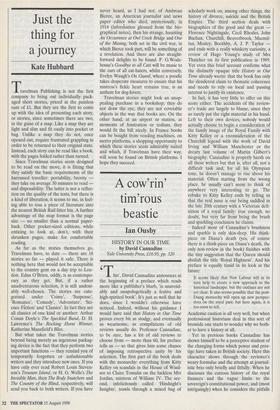Just the thing for a journey
Kate Hubbard
Travelman Publishing is not the first company to bring out individually pack- aged short stories, priced at the painless sum of £1. But they are the first to come up with the idea of presenting each story, or stories, since sometimes there are two, in the guise of a map. Like a map they are light and slim and fit easily into pocket or bag. Unlike a map they do not, once opened out, require frustrated grappling in order to be returned to their original state. Instead, each story can be read like a book, with the pages folded rather than turned.
Since Travelman stories seem designed to be read on the move, it is fitting that they satisfy the basic requirements of the harrassed traveller: portability, brevity they take on average 30 minutes to read and disposability. The latter is not a reflec- tion on the quality of the texts, but there is a kind of liberation, it seems to me, in feel- ing able to toss a piece of literature into the nearest British Rail litter bin. A further advantage of the map format is the page size — no smaller than a normal paper- back. Other pocket-sized editions, while enticing to look at, don't, with their shrunken pages, make for comfortable reading.
As far as the stories themselves go, Travelman have, to date — there are 18 stories so far — played it safe. There is nothing here that would not be acceptable to the country gent on a day trip to Lon- don. Edna O'Brien, oddly, is as contempo- rary as they get. But, if a rather unadventurous selection, it is still undeni- ably well-chosen. The stories are cate- gorised under 'Crime', 'Suspense', `Romance', 'Comedy', 'Adventure', 'Sci- ence Fiction' and 'Classics'. In fact they are all classics of one kind or another: Arthur Conan Doyle's The Speckled Band, D. H. Lawrence's The Rocking Horse Winner, Katherine Mansfield's Bliss.
But what takes the Travelman stories beyond being merely an ingenious packag- ing device is the fact that they perform two important functions — they remind you of temporarily forgotten or unfashionable writers and they introduce new ones. If you have only ever read Robert Louis Steven- son's Treasure Island, or H. G. Wells's The Invisible Man, then The Body Snatchers and The Country of the Blind, respectively, will send you back to both writers. If you have never heard, as I had not, of Ambrose Bierce, an American journalist and news paper editor who died, mysteriously, in 1914 (infoniration gleaned from the bio- graphical notes), then his strange, haunting An Occurrence at Owl Creek Bridge and One of the Missing, both set in the civil war, in which Bierce took part, will be something of a revelation. And there are also straight- forward delights to be found. P. G.Wode- house's Goodbye to all Cats will be music to the ears of all cat-haters, whilst conversely, Evelyn Waugh's On Guard, where a poodle takes desperate measures to ensure that his mistress's fickle heart remains true, is an anthem for dog-lovers.
Travelman stories might look an unap- pealing purchase in a bookshop; they do not draw the eye, they are not covetable objects in the way that books are. On the other hand, at an airport or station, at moments of frustration or tedium, they would fit the bill nicely. In France books can be bought from vending machines, on metro platforms, a shopping opportunity to which these stories seem admirably suited and which, if Travelman have their way, will soon be found on British platforms. I hope they succeed.


























































 Previous page
Previous page